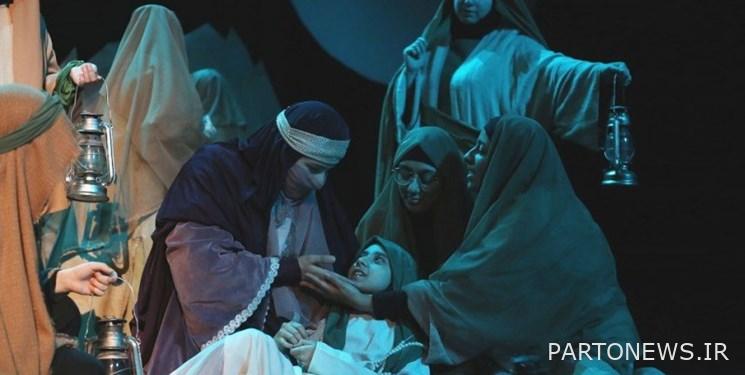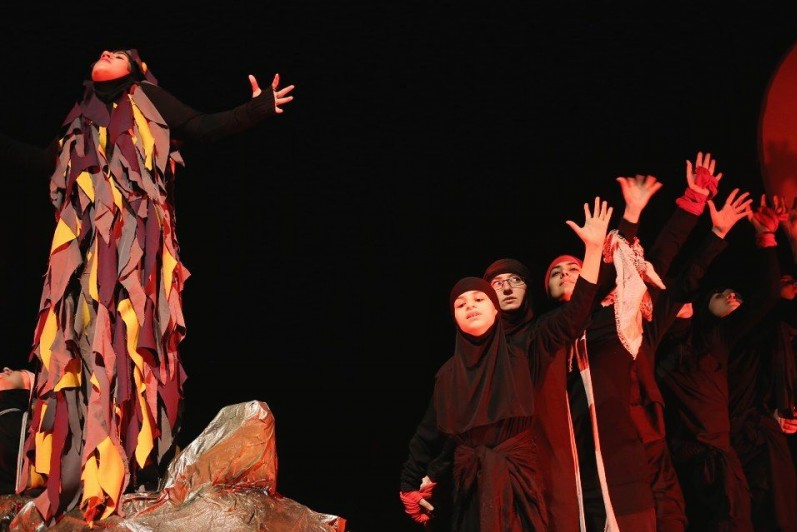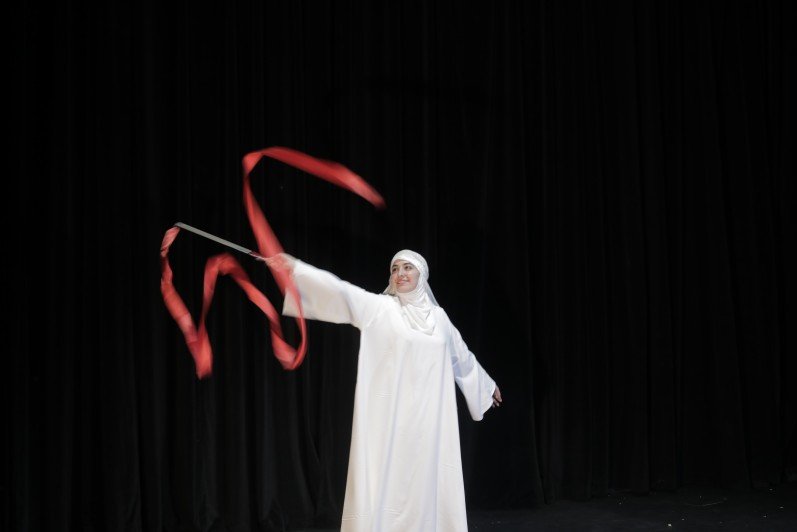Seven scenes from the unheard and unspoken words of the Lady of Two Worlds / Theater that challenges women

Family group: A girl named Fatima comes down from heaven to save the earth from darkness. Lucifer marches to block her path, and Fatima encounters events along the way, eventually becoming immortal. Fifty performers or performers all on the stage of the play “Fatemeh (PBUH)” talk about different situations in the life of Hazrat Fatemeh (PBUH), what we may not have heard or what we have known by mistake.
From motherhood, birth, marriage, her presence in the wars to the economic and political conditions of that time and finally her immortality that puts the audience in a beautiful excitement and shock. The play Fatemeh (PBUH) directed by Maryam Shabani has been performed in the field of art since the days of Fatemieh.
The feature of this show is that its audience is only women. One of the mothers of the play says that addressing the dimensions of the life of Hazrat Zahra (PBUH) is the best option for our mothers and daughters because she is a lady of Islam and a successful woman in society and an important political and economic leader whose behavior for Every mother is considered the peak.
Another lady who came to see the work says that a lot of effort has been put into this play and what we have heard has been researched for years to come up with these concepts. Many of our interpretations of the life of Hazrat Zahra (PBUH) have been wrong. have been.
The play Fatemeh (PBUH) is performed in the form of monologues and form movements. In fact, in the theatrical sense, it is a performance lecture or sermon, and it is performed by the Holy Art Theater for women, and now this group has been performing for women for eleven years. have. The focus of this group is the women historians of the Islamic world and Iran.
The show has been performing for some time, at the same time as the Fatimid era, which started in the art field, and until January 16th, it will be staged every night at 6 pm in the Surah Hall of the Women’s Art Center, and is scheduled to continue its work in other halls. The performance of this play in the field of art has been so welcomed by women that in the last nights, tickets have not been sold anymore and the reservation has been completed from the previous days.
Three years of research on Fatemeh Zahra
“Maryam Shabani”, the director of this play, says about her theatrical works and the main idea of her works: “The subjects of this play are about women historians of Islam and Iran. In general, our group researches and performs in this field and in relation to women and women.” . For three years, through studies related to Hazrat Zahra (PBUH), we have realized how much her life, her lifestyle and even her hijab, personal and social life and clothing have been abandoned.
Even some parts of it were shown to us in another way that I, as a Muslim woman, did not have the correct information in this regard. Therefore, we talked and studied with some thinkers and researchers inside and outside Iran, and therefore we reached a clear point and felt that this year we must work on a play about Hazrat Zahra (PBUH) and many of these points To work when we arrived. It so happened that it took us three years of research, development, pre-production and work to get it done.
Seven scenes from the life of Hazrat Zahra (PBUH)
He explains about the performance of 50 performers in this work: We took six months to perform the artists, to train 150 artists for 6 months to perform performers, school studies and theater flow, they spent about two hundred hours in class and then just started working. The rehearsals took place, and in the end, 50 performers and 20 stage actors performed, and the stage actors studied a number of disciplines of theater, acting, costume design, make-up, stage decoration, etc., which we used their presence in the work.

Finally, this play has seven scenes from the life of Hazrat Zahra (PBUH) on the stage, which mostly revolves around her love for her father, wife, child and love for the ummah.
Sha’bani says about different parts of the play: One part of the play is about the hijab of Hazrat Zahra (PBUH) which according to what is stated in their research, Hazrat Zahra (PBUH)’s tents and clothes are colored and in general Arab women of that period are not black. They wore and even used colored clothes and jewelry at home. This should definitely be interesting for an Iranian Shiite Muslim woman. Even in addition to helping the orphans and the families of the war martyrs and preparing food for them, they did not neglect order and tidiness with their spouses, and this is a very important point for the Iranian lifestyle.
In designing our clothes, we tried not to use black color and we even heard that his folder was under the eyes and we observed this in the performance and even in his wedding and the dowry that Imam Ali (AS) is ready for them. We did it one by one with the titles, and the dowry was at the same time in the dignity of a Muslim believing girl, although it was simple, but in any case, Imam Ali sold his armor to prepare this dowry, and this means that the dowry was important to him at the same time. And another point is the discussion of the social and political presence of Hazrat Zahra in the discussion of Fadak, who themselves appeared in the mosque and faced men who wanted to do this oppression to the Islamic Ummah and Hazrat Zahra (PBUH), Hazrat Zahra (PBUH) even for The rights of Jews and non-Muslims have also been fought.
The presence of Hazrat Zahra (PBUH) in the wars and along with her father or husband was in the form of a nurse. Other women accompanied or even fought in some wars, such as Nasibeh and also the role of Hazrat Zahra (PBUH) in the Uhud war. Along with other issues, it has been considered that he, along with the Prophet’s aunt, washes his swords and bandages the Prophet’s wounds, and all of this is shown in the form of a performance.

Many performances in the field of religious drama have been performed in various halls such as Vahdat Hall, Art Center or other centers, but many of them, despite the high costs, could not attract the audience as they should and perhaps or with Existence of many actors to convey the content smoothly.
“Performance is a modern art, not a genuine Iranian art, so we tried to make it indigenous and ritualistic,” Shabani said. We did this as a speech-performance, that is, in each scene, the text and the scene were played as a monologue and the performance was performed along with it, and this helped the general audience a lot. Of course, we tried to use fewer words again, because the performance task is to leave the message to the audience rather than using more words.
Many people gave us feedback on why we removed parts of Hazrat Zahra’s life or the shrine of the door and the wall. (PBUH) and then what we had in mind, the immortality of Hazrat Zahra (PBUH) and that she will be martyred and immortalized in the way of Imam Ali (PBUH) and this also excited many people in the end that the presence We showed the Imam in the resurrection and that he will enter Paradise with his companions.
Many scholars of the Qur’an and the history of Islam who saw the work were satisfied and said that this was the first time they had seen and heard such an approach about Hazrat Zahra (PBUH).

Shabani says about the reason for performing this work only for women: Theater is a living art that needs to connect souls. I always wanted to study theater, but because of my religious background, I was not able to attend theater because of the atmosphere in the university theater of the country. So we organized this group so that women can watch the play with peace and goodness. In my opinion, a Muslim woman needs an independent space in every situation, from art to sports, so it turned out that we do our work for women.
This play has started its work since the Fatimid era in the Soura Hall of the Arts Center and will continue until Friday the 24th. The performance of this play will continue from January 17 to February 26 in Avan Shams Hall, at the beginning of Kurdistan, and then from February 29, it will be performed for 10 nights on the campus of Tehran Theater. Reserved for ladies.
The play “Fatemeh” is written and directed by Maryam Shabani and produced by Hamid Reza Mumtazan. The actors of this play are Mohadeseh Javadi, Fatemeh Moradi, Fatemeh Nouri Shokri and Fatemeh Masoudian. Also, the narrators of this play are Fada Sadat Hosseini, Narjes Shayan, Fatemeh Nouri Shokri, Zahra Abu Fazli, Gholamreza Javadi, Hamidreza Mumtazan. The form group of this play is Mohadeseh Ramezani as the senior leader of the form, Sara Ghaderi, Saba Rezaei and Fatemeh Moradi are also the leaders of the form.
Also the performers of this play are Sara Ghaderi, Saba Rezaei, Reyhaneh Afshar, Fatemeh Moradi, Atieh Bahri, Shakiba Abdi Motlagh, Maryam Tavakoli, Mahsa Dalili, Fatemeh Masoudian, Fatemeh Goodarzi, Iran Salimi, Zeinab Sadeghi, Hanieh Taybi, Zeinab Nazem Vafadaran, Reyhaneh Roit, Mahna Ali Akbar Khoei, Fatemeh Sarang, Fatemeh Dargahi, Zeinab Dargahi, Hasti Herati, Maedeh Tajik, Shakiba Soroushnia, Mohadeseh Shakouri, Hananeh Haddadi, Moloud Sadr al-Hosseini, Noor al-Huda Heidarifar, Zahra Karimari, Zahra Karizari Zeinab Abdoli, Zeinab Eskandarian, Mohadeseh Sadat Shirazi, Sana Sabzali, Narges Sadegh Beigi, Fatemeh Koushki, Reyhaneh Ahmadi are in charge.
End of message /
.

